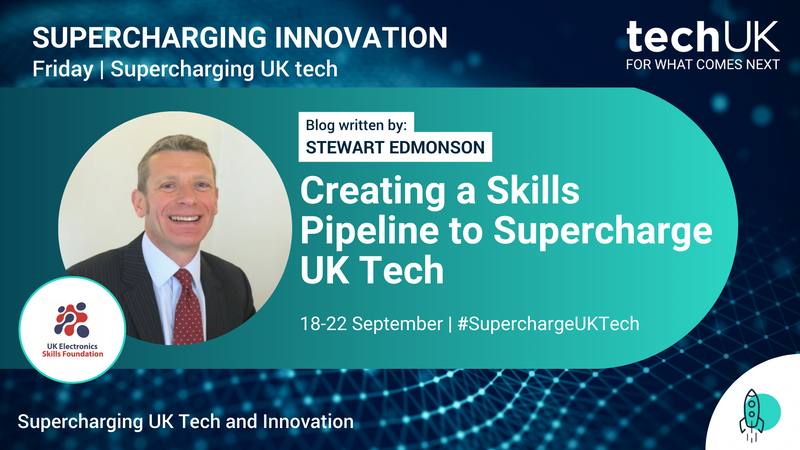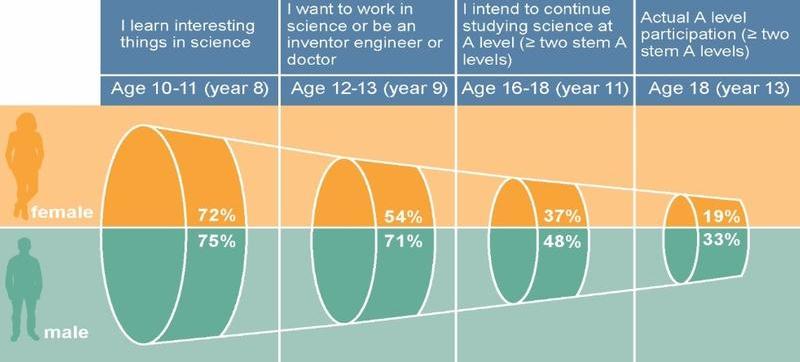Creating a Skills Pipeline to Supercharge UK Tech

For the UK is to be a world leader in technological excellence, then it would seem self-evident that we need more young people pursuing careers as researchers, engineers and innovators in Tech. This need is particularly true for semiconductors, which are a fundamental enabler to ‘supercharge’ UK Tech. Semiconductors or ‘chips’ are used in so many products that are now part of our everyday lives and will become ever more important to the success of the UK economy. However, a chronic skills shortage threatens the UK semiconductor industry’s ability to compete on a global stage.
In the coming years, we know that semiconductors will become ever more important to the success of the UK economy, not just as an essential enabler of existing industries but also as a driver of emerging technological focus area such as smart cities, autonomous driving, electrification, and artificial intelligence (AI) as a whole.
As AI becomes embedded in people’s lives, the UK finds itself at a pivotal moment - It has been suggested that AI could deliver a 10% increase in UK GDP in 2030. The Government believes that, if approached correctly, this would offer huge benefits to the economy, to recovery and resilience, the environment and for people from all walks of life across all parts of the UK. However, a shortage of skills is frequently cited as a critical challenge.
Over many years, too few UK-based students have been studying Electrical & Electronic Engineering. As a result, there are insufficient graduate engineers to drive forward innovation and progress. In 2021, according to UCAS, only 3,245 UK students enrolled on degrees in Electronic and Electrical Engineering, and of these only 335 were girls. This is less than half the number of students starting Mechanical Engineering degrees (7,050). This shortage is particularly acute in the sphere of chip design. We know through our own research that over 80% of UK companies involved with chip design have unfilled vacancies. Global competition for talent is fierce and other nations, such as the USA, are already investing heavily.
Therefore, engaging and inspiring a diverse range of students, effective engagement with schools, colleges and universities across the UK is crucial. With gender parity and greater inclusivity, we’ll be far better placed to foster new discoveries and technological innovation; to create highly skilled jobs, and to be at the cutting-edge of these vital technologies. To address this skills shortage, it’s clear that urgent changes have to be made. These must form part a national level long-term programme.
This is because we believe that the situation for the semiconductor industry in the UK is very similar to the one faced by the digital sector a decade ago. Then a Government’s report on digital skills resulted in coordinated action, including curriculum change for computing at secondary schools and the creation of National Centre for Computer Education.
The STEM Decision Funnel, developed as part of a research programme at King’s College London, illustrates students engaging with STEM reduces significantly as secondary education progresses. The evidence demonstrates that both male and female students in the final year of primary school have relatively high levels of interest in science (74% and 72% respectively).

Therefore, we believe that secondary schools should be the starting point for the semiconductor skills pipeline. This is because we need to ensure schoolchildren are more aware of Electronics and it is essential to motivate and inspire them to consider careers in semiconductors, earlier in the STEM decision ‘funnel’. To begin this process, we are advocating three key priorities within secondary education: curriculum change, more engagement with the Electronics industry and improved careers advice.
First and foremost, there is an urgent need to make Electronics and semiconductors a more visible and explicit part of the STEM curriculum for secondary schools. Also, we must ensure that an understanding of ‘deep tech’ is woven into wider aspects of secondary education so children, parents and teachers are aware of how semiconductors and Electronics are fundamental to the modern world. From this awareness, interest and understanding can grow along with the realisation that exciting challenges and rewarding careers that pay well are available for designers and engineers in the semiconductor sector.
Beyond the curriculum, there is a need to provide engaging enrichment activities and more extra-curricular opportunities for pupils to deepen their interest in Electronics and semiconductors.
As the leading Electronics focussed STEM charity in the UK, UKESF stands ready to collaborate with Government and other stakeholders including academics, industry and professional bodies to build the skills pipeline needed to supercharge UK Tech in the 21st century.
techUK – Unleashing UK Tech and Innovation
The UK is home to emerging technologies that have the power to revolutionise entire industries. From quantum to semiconductors; from gaming to the New Space Economy, they all have the unique opportunity to help prepare for what comes next.
techUK members lead the development of these technologies. Together we are working with Government and other stakeholders to address tech innovation priorities and build an innovation ecosystem that will benefit people, society, economy and the planet - and unleash the UK as a global leader in tech and innovation.
For more information, or to get in touch, please visit our Innovation Hub and click ‘contact us’.
Latest news and insights
Other forms of content
Sprint Campaigns
techUK's sprint campaigns explore how emerging and transformative technologies are developed, applied and commercialised across the UK's innovation ecosystem.
Activity includes workshops, roundtables, panel discussions, networking sessions, Summits, and flagship reports (setting out recommendations for Government and industry).
Each campaign runs for 4-6 months and features regular collaborations with programmes across techUK.
techUK's latest sprint campaign is on Robotics & Automation technologies. Find out how to get involved by clicking here.
Running from September to December 2023, this sprint campaign explored how the UK can lead on the development, application and commercialisation of space technologies, bring more non-space companies into the sector, and ultimately realise the benefits of the New Space Economy.
These technologies include AI, quantum, lasers, robotics & automation, advanced propulsion and materials, and semiconductors.
Activity has taken the form of roundtables, panel discussions, networking sessions, Summits, thought leadership pieces, policy recommendations, and a report. The report, containing member case studies and policy recommendations, was launched in March 2024 at Satellite Applications Catapult's Harwell campus.
Get in touch below to find out more about techUK's ongoing work in this area.
Event round-ups
Report
Insights
Get in touch
Running from January to May 2024, this sprint campaign explored how the UK can lead on the development, application and commercialisation of the technologies set to underpin the Gaming & Esports sector of the future.
These include AI, augmented / virtual / mixed / extended reality, haptics, cloud & edge computing, semiconductors, and advanced connectivity (5/6G).
Activity took the form of roundtables, panel discussions, networking sessions, Summits, and thought leadership pieces. A report featuring member case studies and policy recommendations was launched at The National Videogame Museum in November 2024.
Get in touch below to find out more about techUK's future plans in this space.
Report
Event round-ups
Insights
Get in touch
Running from July to December 2024, this sprint campaign explored how the UK can lead on the development, application and commercialisation of web3 and immersive technologies.
These include blockchain, smart contracts, digital assets, augmented / virtual / mixed / extended reality, spatial computing, haptics and holograms.
Activity took the form of roundtables, workshops, panel discussions, networking sessions, tech demos, Summits, thought leadership pieces, policy recommendations, and a report (to be launched in 2025).
Get in touch below to find out more about techUK's future plans in this space.
Event round-ups
Insights
Get in touch
Running from February to June 2025, this sprint campaign is exploring how the UK can lead on the development, application and commercialisation of robotic & automation technologies.
These include autonomous vehicles, drones, humanoids, and applications across industry & manufacturing, defence, transport & mobility, logistics, and more.
Activity is taking the form of roundtables, workshops, panel discussions, networking sessions, tech demos, Summits, thought leadership pieces, policy recommendations, and a report (to be launched in Q4 2025).
Get in touch below to get involved or find out more about techUK's future plans in this space.
Upcoming events
Insights
Event round-ups
Get in touch
Campaign Weeks
Our annual Campaign Weeks enable techUK members to explore how the UK can lead on the development and application of emerging and transformative technologies.
Members do this by contributing blogs or vlogs, speaking at events, and highlighting examples of best practice within the UK's tech sector.
Summits
Tech and Innovation Summit 2025
Tech and Innovation Summit 2023
Tech and Innovation Summit 2024
Receive our Tech and Innovation insights
Sign-up to get the latest updates and opportunities across Technology and Innovation.

























































